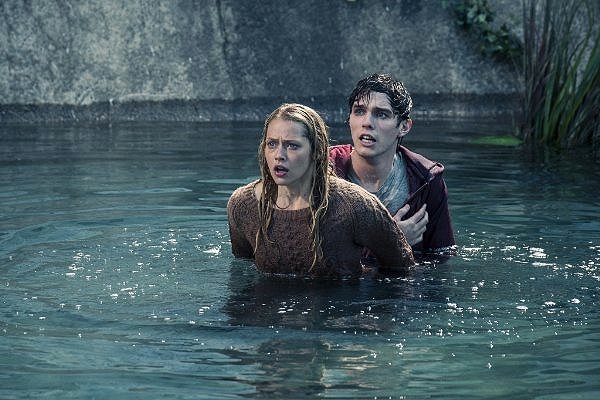*Promotional Poster for Killing Them Softly*
Don't believe much of what you watch in terms of trailers and teasers for Killing Them Softly; this is an art-house romp if their ever could be one for the action genre. Honestly, calling this movie an action film isn't really a good decision either, it's basically a drama film with guns and violence, but a pretty good one at that. Despite being completely overlooked last year during it's prestige season release, this is probably one of Brad Pitt's most alluring outings in years.
WARNING: This review may contain spoilers.
Right from the onset of the film it's clear that this movie is not looking to fall in line with any other film; it seeks to be a unique experience revolving around crime and punishment. The films themes and story are simple, and it's rooted in straight forward character progression and consequences for ones actions. The movie centers around a robbery that capitalizes on a bookies decisions a while back to rob his own poker games. In doing so, all involved would assume that Markie, the bookie (played by Ray Liotta), decided to rob from his own people yet again, and pin the crime on him, leaving the real culprits to get away.
Jackie, played by Brad Pitt is a hitman brought in to dissect the situation and restore order. His character is a man of logic and reason whose experiences aid him in decisions to kill his victims softly, which basically means he allows them little to no time to know they are about to be killed. Jackie does this so throughout the film that it unfortunetly becomes predictable as to when it is going to happen, but the good thing about the movie is in how it chooses to portray these events with good cinematography and dialogue that keeps the characters feeling authentic and easy to sympathize with, even at there least most redeemable moments. The films most complicated character perhaps is Mickey Fallon, played by the late James Gandolfini. His character is remorseless and bitter in his opinions towards others and the world, a loose cannon that Jackie soon learns upon calling for his assistance that he may need to let go. Gandolfini's character is given a few moments here and there on screen to flex his acting skills, but enough to portray a life hardened by the decisions of a less than commendable career choice; polarizing in comparison to Gandolfini's own list of amazing accomplishments.
The stark bleak nature of this film makes it a very gritty, very talky film that rarely says enough to lose interest, and is
further aided by a very short and much appreciated film length. This makes the deliberately slow pacing a perfect match for the small but powerful amount of content story wise. It doesn't seek to flesh out a plot heavy narrative, but rather combine intriguing camera work, stellar acting, and an uncompromisingly dark tone to fill in any time where the movie may seem to be running it's scene too long. One that comes to mind is when Markie is being robbed. The scene goes through the entire robbery, and every time it is about to feel as if it's overstaying its welcome, something happens within context to keep your interest. Markie's character is such a sad case before his demise in the film, that given the overall tone and the events that take place, he almost seems a victim rather than an instigator; but still a perpetrator in his own death.
While Killing Them Softly is not an easy watch for it's dark narrative, it is evident from the get go that it has reason to remain so. The film has it's own set of politics in which it portrays America as a business, and this theme is central to the stories progression as it showcases the necessity of order and balance once business is disturbed The weight of all the issues tackled by the movie justifies the thin plot, since the atmosphere is primarily responsible for conveying the appropriate feelings that one should experience while watching the movie: lose, regret, sympathy, sadness, anger, disdain. It could have easily been a trigger-happy action-centric winter release, but it would've been much harder to take the film serious had this been the road chosen.
In the end, great acting and a reasonable length are the strongest assets behind this being a great movie; Killing Them Softly is not a recommended film for everyone, but it's a much appreciated short journey into the gritty underbelly of a world frequently visited in cinema, but never to such an cinematography art-house friendly degree. It's hard not to like a movie that takes an idea one could summarize in a sentence and make it last 90 minutes with both style and substance to spare. While not perfect, finding it's equal in our times is an exercise in futility, but one can only hope this movie will somehow set a future standard for how action movies can be subtle and aggressive at the same time if one works the direction well enough.
Check out the trailer for Killing Them Softly below!
Review Score Card:
Storyline: Basic, Thin, but thoroughly entertaining to watch unfold.
Characters: Brad Pitt is at his best, everyone else is A-list, great characters overall.
Pacing: Very slow, but a short movie, never overstays it's welcome.
Interest level: Done so well that it's easy to appreciate everything it does, both good
and not as good.
Overall: 8.5 out of 10 - Artsy, gritty, aggressive yet subtle. A unique action-drama
experience.





























